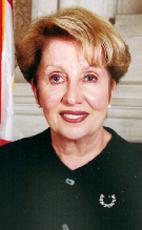Mr. Speaker, the reorganization proposed in Bill C-53 to make the Department of Canadian Heritage a promoter of Canadian culture from coast to coast is in fact a direct attack by the federal government on Quebec's specificity, in terms of its culture, language and cultural institutions.
This is evidenced by the inclusion of the Canadian culture in Canada's new foreign policy and it demonstrates once again the growing desire of the federal government to marginalize Quebec's specificity by imposing an all encompassing Canadian multiculturalism. This desire was very clearly expressed by the Minister of Canadian Heritage in his speech on Bill C-53, when he said: "We hope to rally the mighty forces of multiculturalism behind a cultural identity that is uniquely Canadian".
The objective is clear. Since the only references made in that speech to French culture in Canada concern the official languages and TV5, we have to conclude that the government feels it must absolutely manage to bring not only Quebec culture but also native culture into the supposedly ideal context of multiculturalism, considering the ever present and ever powerful American culture.
In such a context, you can easily imagine that the Official Opposition feels it would be suicidal to support Bill C-53.
In spite of the noble statements made by the minister, a man of letters if there ever was, how can the Canadian Parliament not be concerned to see today's culture, including our authors and creative artists-what I would call heritage in the making-be considered like an industry such as steel, footwear or poultry?
For example, who will have the last word on the review of the Copyright Act? The Minister of Industry or the Minister of Canadian Heritage? Chances are that the Minister of Industry will keep the powers already vested in him, since nothing in Bill C-53 clearly states how responsibilities are to be divided between the two departments.
Here is another example that should ring an alarm bell in this House. Thanks to the information highway, communications will soon reach a speed of Mach 2. Is it reasonable to reduce the whole issue to the marketing of fibre optics?
Yet, that is the conclusion we must reach since the Minister of Industry will be the one in charge. They are thus refusing to admit that the major technological revolution generated by the information highway will no doubt transform global culture quickly and dramatically.
It is often said that war is too serious to be left to generals. Could it be that a society's culture is too precious to be left to technocrats and businessmen?
I think that Quebec culture is too precious to be left in the hands of the federal government. The state of Quebec must be the only authority responsible for Quebec culture.
Quebec's historical demands in the field of culture have always been based on the recognition of its specific identity and on the desire of the Quebec government to be the only one in charge of promoting and defending Quebec culture. Examples of this political will are not lacking. In 1966, at a meeting on Canada's tax system, Premier Johnson said that Quebec must be the master of its decisions concerning cultural development.
In 1969, Premier Bertrand said that cultural affairs were in Quebec's jurisdiction. In 1973, under Robert Bourassa, Quebec wanted to take back control of all cultural policy, including the federal funding for it. In 1976, Quebec proposed that each province alone legislate on issues concerning the arts, literature and cultural heritage.
More recently, in 1991, the Bélanger-Campeau Commission mentioned the need for Quebec to have exclusive jurisdiction and responsibility for social, economic and cultural development. The same year, the Arpin Report, commissioned by the Quebec government at that time, said this: "We can conclude that overlap between the two levels of government clearly exists in terms of structures, programs, target groups and even legislation and fiscal measures. . . Harmonizing the action of the two levels of government has always been difficult. The federal government never wanted to recognize Quebec's precedence in cultural affairs".
For more than thirty years, the federal government, on the strength of its spending power, has meddled without any scruples in culture. The purpose of these incursions was clearly to downplay the impact of Quebec culture. The result has been to
promote duplication and overlap, while making the arts community dependent on federal largesse.
The federal cultural offensive reflected in Bill C-53 is only the tip of the iceberg. Consider the report of the Special Joint Committee reviewing Canadian Foreign Policy, which confirms Ottawa's resolve to subject Quebec culture to federal standards.
The dissenting report tabled by the Official Opposition condemns this attempt by the federal government to dilute Quebec's distinct identity by stirring it into a Canadian sauce of bilingualism and multiculturalism. Clearly, the sauce makes the dish.
The Official Opposition maintains, and I quote: "Where culture is concerned, the direction of Canada's foreign policy, as prescribed in the majority report, is based on the theory of a single nation, one single culture (so-called Canadian culture), and the resulting requirement that all the provinces must have equal status".
To the Official Opposition, it is clear that "the principles of bilingualism and multiculturalism, which form the political bases for defining so-called Canadian culture, have the effect of denying the existence of Quebec culture, which is original and which developed essentially from its French origins, with contributions from the British, the aboriginal peoples and, more recently, the various immigrant communities".
Quebec will never let its culture be beholden to the federal government. The Official Opposition vigorously condemns this blatant attempt to make Quebec subject to federal dictates.

